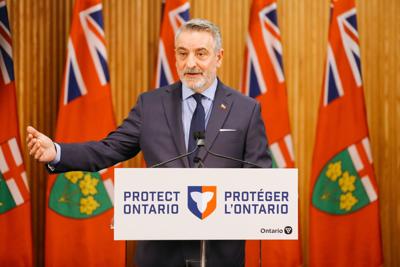Doug Fordās Tories have seized control of ĪŚŃ»“«Ć½ās two big school boards, prompting doomsday warnings from displaced and disenfranchised trustees:
A hostile takeover.
An anti-democratic coup.
Unsurprisingly, these elected school trustees are seething. In effect, theyāve been suspended without pay, like students sent home for misconduct (Catholic trustees will still get 25 per cent of their pay because they will be doing Godās work deciding on denominational questions).
- Isabel Teotonio, Asma Sahebzada
Now, the education ministry has sent in outside āsupervisorsāĀ ā call it adult supervisionĀ ā to get the ĪŚŃ»“«Ć½ District School Board, Canadaās biggest, back in the black. Trustees at the ĪŚŃ»“«Ć½ Catholic, Ottawa-Carleton and Dufferin-Peel Catholic school boards were similarly sidelined for running up massive deficits while getting bogged down in political sideshows.
Education Minister Paul Calandra says the trustees werenāt doing their homeworkĀ ā which required them to eliminate board deficits. They couldnāt make the math work.
Now, theyāre accusing the Tories of nibbling away at democracy itself. But democracy and accountability only go so far when youāre a school trusteeĀ ā and a bankruptcy trustee is at the door.
Allegations of financial mismanagement prompted the provincial government to send in outside accounting firms to look at the books. Turns out the Dufferin-Peel board is at ārisk of defaulting on its financial obligationsā and faces a deficit of $106 million, Calandra says.
ĪŚŃ»“«Ć½ās Catholic Board is running a $75.2-million deficit and the TDSB is on track for a $58 million shortfall next year. Those numbers are bad, but the democracy deficit run up by trustees also looks bleak.
Trustees like to talk up their fidelity to democracy. But even when they win on election day, they donāt win all that many votes.
Voter turnout for school trustees ranged from about 24 per cent in some wards to 35 per cent in others, which is hardly a resounding victory for democracy.
Mathematically thatās not much of a mandate for a school trustee. Trustees are the forgotten, forsaken politicians in our democracy.
In reality, most voters donāt have a clue who to vote for because they canāt keep track of whoās coming and going. Quebec and Nova Scotia have curtailed trustee elections because turnouts were so low that they made a mockery of democracy.
In Ontario, trustees donāt have taxing powers, just spending powers, which is perhaps why they have trouble reconciling their budgets to reality. In truth, too many trustees use school boards as a training ground for higher office, bolting at the first opportunity.
Shan, for example, has run for various elected offices 13 times since 2003, briefly serving as city councillor and then returning to the TDSB when his luck ran out. Now Shan is running again in a byelection to reclaim a seat on city council, poised to leave his trusteeās job vacant.
The trouble with school boards is that they are weighed down by the stepping-stones that trustees climb on their way up. Then there are the trustees who blatantly overreach, conjuring up a trip to Italy for an art-buying spree to spruce up their schools (Calandra set a deadline for the Brant Haldimand Norfolk Catholic District School Board to reimburse taxpayers for the $145,000 cost of that junket).
Too often, the job of trustee looks like democracy on training wheels, but without the traction. All that said, by taking over the troubled school boards, Calandra is also taking political ownership of all the problems heās promised to fix.
Henceforth, if parents have complaints, theyāll know who to hold accountableĀ ā not the local trustee theyāve never heard of nor voted for, but the provincial education minister who is promising to save the day. That puts the onus on the Progressive Conservative government to put its money where its mouth is.
Critics point out that per-pupil funding has dropped (after inflation) since the Tories took power in 2018, so the buck stops with Ford. Queenās Park cried foul because too many boards were starting to sell property and other assets to pay operating expenses, which is no way to balance a budget year after year.
But for all the foibles of trusteesĀ ā the junkets, deficits and distractions (like changing school names)Ā ā there are hard decisions to make. If trustees canāt bring themselves to make those tough calls, Calandra will now have to play tough guyĀ ā not just with school boards, but his cabinet colleagues.
The education minister told the Starās Kristin Rushowy that he has sent in supervisors to look at unfunded programs and reducing bureaucracy so they can focus on pedagogy, but he also sympathizes with calls to keep pools open. There is bloat in the boards, to be sure, but not as much as the province likes to pretend.
When all is said and done, sidelining trustees isnāt a diminution of democracy. An elected provincial government with a broader mandate will be more accountable to voters.
For better or for worse, Calandra will get his way. To which one might say, be careful what you wish for.
Error! Sorry, there was an error processing your request.
There was a problem with the recaptcha. Please try again.
You may unsubscribe at any time. By signing up, you agree to our and . This site is protected by reCAPTCHA and the Google and apply.
Want more of the latest from us? Sign up for more at our newsletter page.

































To join the conversation set a first and last name in your user profile.
Sign in or register for free to join the Conversation